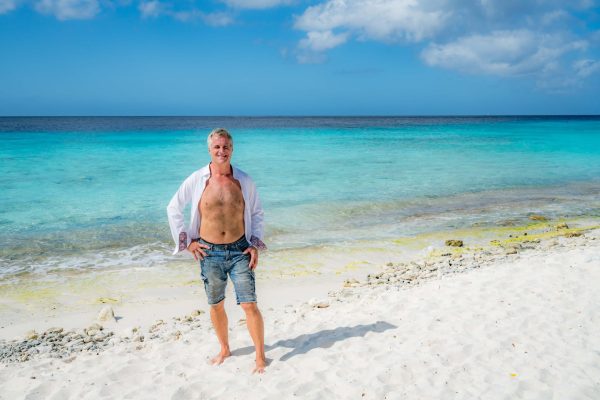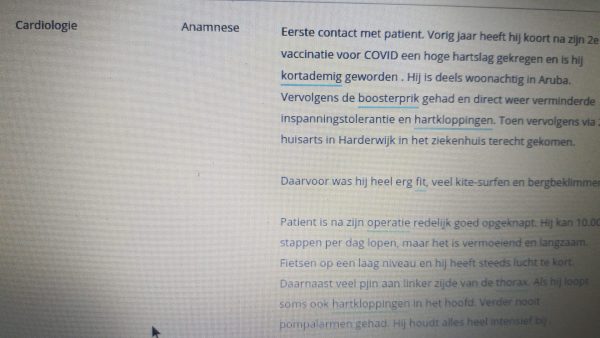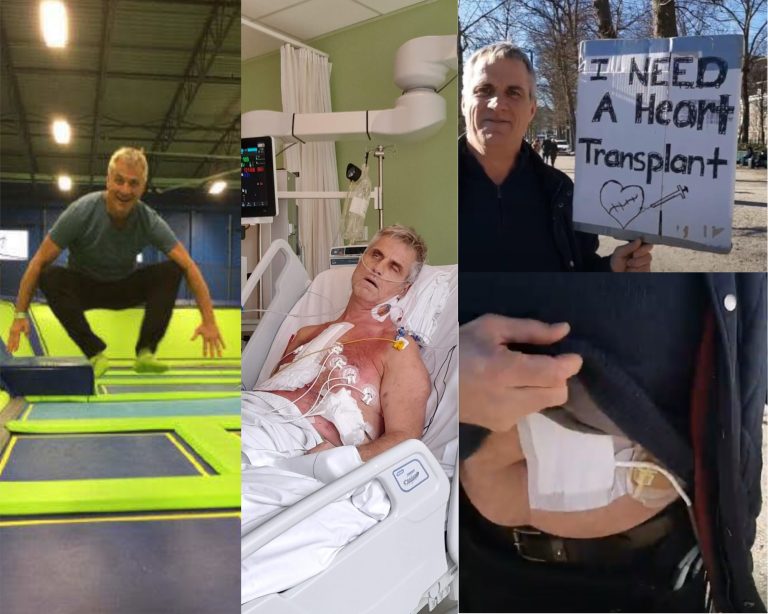A Dutch-Canadian man developed severe heart failure and now requires a heart transplant, a condition which developed shortly after taking the booster shot of Pfizer’s Coronavirus Disease 2019 (COVID-19) mRNA gene therapy vaccine in order to meet pandemic era travel requirements to enter Canada to see his children.
Before heart failure changed his life forever, Alex van Kooten was an otherwise extremely healthy and fit 52-year-old who frequently enjoyed sports and leisure activities, such as skiing, bicycle racing, and kite surfing.
Alex, who was born in the Netherlands, immigrated to Canada with his parents at the age of 9, spending most of his life in the Toronto and London regions of Ontario before relocating to the Caribbean after completing his professional career.
Once a corporate salesperson and sales manager for companies such as Hilti and Black & Decker, Alex and his wife decided it was time for a change and moved to Aruba to manage property in 2017.
Trapped in paradise
For the couple, once the COVID-19 pandemic began and worldwide lockdowns started to hit in the beginning of 2020, leaving the island suddenly became off the table.
Success
You are now signed up for our newsletter
Success
Check your email to complete sign up
Seemingly overnight, Aruba had transformed from a sunny island paradise into a 180 square kilometer waiting area.
“I had worked very hard in my life at an early age, and decided to semi-retire,” Alex told Vision Times. “That’s why we moved to Aruba to enjoy the weather, and then COVID hit, and needless to say that we were kind of stuck.”
Alex continued, “And we’re hoping, obviously, that things would go better. We had our own little business there with vacation homes, and of course with the lockdowns, that didn’t go very well.”
“And then finally, after two years of not seeing the children, the only option we had to see the children was to get vaccinated in order to get back into Canada,” he added.
But plans to return home to visit with their adult children proved difficult to arrange. At the end of January of 2021, the Government of Canada declared it was suspending travel from Caribbean countries, effective until the end of April.
A press release by Transport Canada at the time announcing the Caribbean suspension also told the public that “all air travellers arriving in Canada, with very limited exceptions, must reserve a room in a Government of Canada-approved hotel for three nights at their own cost.”
Mandatory quarantine on arrival in a first world country was before then effectively unprecedented. And as vaccine passports began trending in a number of countries around the world, Alex started to feel that the writing was on the wall and it was only a matter of time until his wish to return to Canada to see family would be predicated on getting vaccinated.
“I wanted to see my children in a bad way after two years…That’s not a fun thing,” he said.
Alex continued, “You know, I’m feeling like we were trapped. It sounds like you’re in paradise where you’re invited, but trust me, you feel trapped [in Aruba], even though it’s sunny every day.”
A tough decision
Alex told Vision Times that he had reservations about both the vaccines and the risk of serious illness from COVID for people as healthy as he was, “I was very reluctant. I’m not an anti-vaxxer, but I’ve always been against the flu shot. And this [COVID], to me, was always a flu,” he said.

“And it didn’t make a lot of sense for healthy people, which I was extremely healthy, to get a vaccine for something that maybe would make me sick for a few days,” Alex added.
“Not knowing when you could resume a normal life…You feel pressured in doing so [getting vaccinated],” Alex said. “I could have waited for another two years, and then [he felt like] maybe I would have been able to see my children after four or five years if they ever removed restrictions. But there’s no guarantee of that,” he added.
So he rolled up his sleeve for the first dose of the Pfizer-BioNTech COVID-19 vaccine in March of 2021 in anticipation of Canada’s Caribbean restrictions being lifted.
And the appointment came and went without any issue, “After the first injection, it just had a bit of a sore arm. I didn’t make a big deal of it,” he said.
But when Alex took the second course of the vaccine required for fully vaccinated status in May of 2021 right before leaving for a trip to Holland, shortly after they had arrived, he immediately began to notice something was wrong.
Heart palpitations and a shortness of breath were the first troubles he experienced, “And two, three days after I arrived in Holland, we go for our first walk. We took our dogs…and I had to tell my wife to slow down because I was out of breath,” he said.
Alex explained the issue was exceptionally prominent for him, since as part of his exercise routine, Alex liked to traverse the Hooiberg hiking trail in Aruba, which involves a 2,500 step climb across a concrete staircase to the top of Mount Hooiberg, a path he had long since mastered.
“At first, I didn’t think much of it, but then [the symptoms] were just on an ongoing basis,” he added.
When the palpitations and breathing issues did not abate, Alex’s doctors in the Netherlands sent him for an EKG. But when the test came back clean, he was told what he was experiencing was psychological and probably only stress related.
“So I lived with this for almost six months. Went back to Aruba, went to the doctor there a few more times because of the issues, same scenario,” he added.
Boosted
Alex was fortunate in that during the first trip, he was able to visit Canada to visit with family in August of 2021 before returning to Aruba in December.
The plan at the time was to visit Canada again in April of 2022.
Canada ultimately mandated vaccine passports as a condition of entry at the end of October of 2021.
Thus, when Alex and his wife returned to the Caribbean, they watched as countries such as France started requiring a booster injection to maintain fully vaccinated status, and so they decided that if he wanted to continue to travel as the pandemic situation evolved, it was prudent to stay ahead of the curve.
So in March of 2022, Alex made his appointment for his Pfizer booster right before leaving Aruba for another 6 week trip to the Netherlands as part of an itinerary that finished in Canada.
But after arriving in Holland, that’s when Alex’s life changed, “Instead of coming to Canada, I ended up in the ICU at the University Hospital in Groningen,” he stated.
He told Vision Times that just days after taking the booster shot he became unable to lie down “without gasping for air and was barely able to walk 20 feet.”
Alex also started gaining weight. A lot of weight. 30 kilograms (66 pounds) was suddenly added to his frame, which doctors later discovered was caused by water retention.
As his symptoms both persisted and worsened throughout his Netherlands vacation, Alex continued to visit local physicians roughly twice per week, “They all said the same thing. You know, we’d go two, three times a week to the doctor, and they said ‘No, no…We’re going to make an appointment with a psychologist for you.’”
‘Wasn’t expected to survive’
When his suffering escalated, Alex found himself in an ambulance en route to a hospital in Harderwijk, where he lost consciousness.
He awoke to find himself in a specialist hospital in Groningen under the care of a cardiologist.
“I wasn’t expected to survive when I was in the hospital on Wednesday night. I woke up on Thursday morning, but on Wednesday night they had called the family to say goodbye because they didn’t expect me to make it through the night. I beat the odds,” he said while describing his experience.
Alex recounted the first time he spoke with the doctor, “And he says, ‘Oh, you’re very sick, sir. How long have you been a heart patient?’ And I’m like, ‘Heart patient? What are you talking about?’”
It turned out that the water retention and the acceleration of Alex’s symptoms appeared to be linked to kidney and liver failure. His kidney functions had been reduced to just 8 percent of their normal capacity.
But when doctors couldn’t find a direct cause, they started to look for heart and artery blockages.
And it was then that they made a shocking discovery: There wasn’t any blockages. Instead, Alex was suffering from a case of heart inflammation so severe that his aortic valve had completely calcified.
He said that doctors described the degree of calcification as one “normally associated with having major heart issues for years.”
Living on life support
In the end, Alex underwent two emergency surgeries.
In the first, a heart surgeon attempted to replace the aortic valve. But when the procedure was unsuccessful, the only way to save his life was to install a Left Ventricular Assist Device (LVAD), which now serves in place of his heart to transport blood throughout his body.
Alex now sits on the waiting list for a heart transplant. In the meantime, he must carry the LVAD machine with him, which is connected to his damaged heart by a tube that runs through the stomach, “My heart basically stands still. My left side does not work at all and there’s the pump that does the work,” he said.

He told us that although his official medical file notes that after his “second COVID vaccination, he got a higher heart rate and became short of breath,” and that after “…he received the booster and immediately had low effort tolerance and irregular palpitations,” doctors have not officially linked his case as a vaccine adverse reaction.
The surgeon also told Alex that his case was notable because the calcification was so extreme and he had no history of heart disease, “He wanted to research. He wanted to check everything at first, because it doesn’t make sense that your heart is all of a sudden bad, that you haven’t been very ill for years and years and years,” Alex told us.
Piecing the puzzle
Until his heart failed, Alex hadn’t connected the symptoms to the timing of his vaccinations, “And then I started piecing the time frame together. That’s when I started, because I did move around, and I had specific dates when I took the vaccine.”
He continued, “And then a large change. Then I flew to a different country. And just prior to going for the climb, I started realizing oh, and then I started doing some research… These are symptoms of myocarditis, and sure enough, symptoms are shortness of breath, heart palpitations.”
The benefits of health
Alex says that his previous good health has turned into a major blessing, “Because my health has been very good, I’m able to at least walk, and walk some distances. Most people that have this can walk across the living room and walk to the bathroom, but it’s very limited. It’s very limited to what they can do. It’s really dependent on the individual.”
His medical file notes that although he’s “able to walk about 10,000 steps a day,” the exertion “is tiresome, and it goes slowly.” The physician also noted that Alex is “also cycling at a low level,” but “is continuously out of breath.”
Alex told us, “Even regular biking is difficult. I can go on a bike, a regular bike, but it’s very exhausting> Whereas, prior, I was on a race bike, going 30, 35 kilometers an hour; it was nothing.”
A short tether
Despite the severity of the tribulation, Alex is optimistic that a heart transplant will be found and he’ll be able to get his normal life back.
But in the meantime, he has to stay within a few kilometers of the hospital in the Netherlands at all times in case the call comes in.
The waiting time is estimated at an average of three years.
Alex says that while waiting, although he wanted to start working in Holland, he encountered difficulty because “nobody wants to hire you because you’re a risk.”
“But I want to work. I’m not going to sit at home, and I feel that I can at least do something and not be twiddling my thumbs waiting for a new heart for a transplant. That’s just not the kind of person I am,” he added.
No compensation
Although the ordeal has produced significant financial hardship for him and the family, Alex says that the Netherlands government hasn’t been helpful on the matter of financial aid or compensation, only directing him to contact legal aid.
“I’ve talked to the Dutch House of Commons, one of the committees that are supposed to be looking after this,” he said. “They ask you to write them so they can put it on the agenda, which I’ve done. I’ve yet to hear back from them. Because there’s clearly not any process in place for putting in claims for people who are in my situation.”
An “expert guide” published by international law firm CMS on its website states that there is currently no legislative framework for COVID vaccine or other vaccine adverse reaction victims in the Netherlands.
Those suffering are covered only under the country’s general legal code and case law, and would be required to file a civil lawsuit and endure its associated costs, procedural lengths of time, and risk of defeat.
CMS notes, “Such proceedings have rarely, if ever, occurred in the Netherlands, so it is not yet clear how successful they would be.”
Alex told us that the situation has left a bad taste in his mouth, “I’m living on borrowed time. I’m living on a life support system. And definitely with the feeling that I’ve been left behind and the government really doesn’t care.”
“I can just go on a normal queue. Doesn’t matter that they messed up my life with the vaccines. I’ve just got to wait like everybody else as if I have a heart issue that wasn’t from, in my opinion, a forced vaccine in order to participate in society,” he continued.
An upright outlook
But despite the challenges, Alex both remains optimistic and is determined to recover and get his life back on track, “You can be depressed and everything else, but I’m looking at there’s a future for me and if you don’t look at it that way, then life becomes very depressing.”
He continued, “And I tend to bypass the average median lifespan just by continuing to live a healthy life I’ve always lived. That’s why I’m smiling.”
Alex also said he was lucky in that his condition developed while in a country as advanced as Holland, “That’s why I’m smiling, because in one way, I also look at the luck I had, if the [reaction] was in Aruba…In Aruba, I would have been dead. They don’t have this technology. I wouldn’t have survived.”
“So even though I had an unlucky side effect, at least I was in a country that could medically help me, at least to make through.”

















